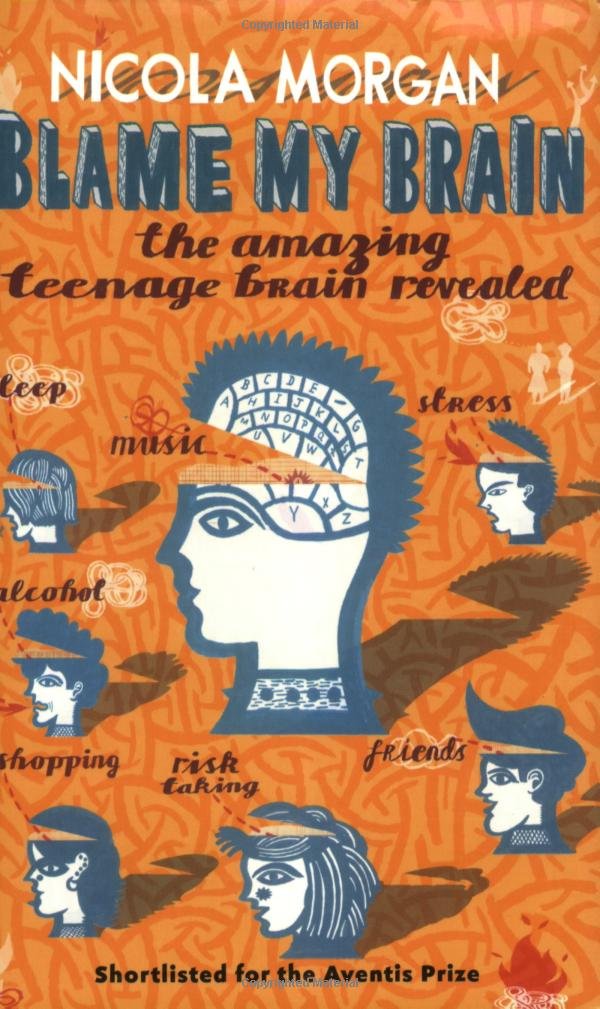Blame My Brain
- Brand: Unbranded

Description
As I say in Blame My Brain, “Adults often ask me, ‘Why does my teenager go along with what their friends want more than what I want, even though what I want is more sensible or better for them?’ My answer is, ‘Because they have to.’ The compulsion for a teenager to gain respect of friends and potential friends is stronger than their desire to please parents.” Our rational, conscious brain thinks it’s in charge. “I eat what I want, when I want it. And I stop when I want to”. But we have a lot less control than that. Behind our decision-making processes are physiological forces we’re never even aware of. It follows, then, that if stored energy (fat) and leptin go up over time, you’ll want to eat less… right? Berthoud HR. 2004. Mind versus metabolism in the control of food intake and energy balance. Physiol Behav 81:781–793
I’ve included a lot of links here. Many of these points are referred to in the sex/gender differences chapter of Blame My Brain and there I discuss to what extent any differences might be mostly based on biology/nature or mostly based on culture/nurture.) My inclusion of any specific study does not mean I agree with it but that it is worth reading and considering when weighing up what you think about all this. Also that it could be a starting point for your own further reading.) Cummings DE, et al. 2001. A preprandial rise in plasma ghrelin levels suggests a role in meal initiation in humans. Diabetes 50:1714–1719 Clearly, people’s physiologies vary a lot. In some people, when leptin rises, their brain decreases their appetite, and increases their NEAT output. In others, the response isn’t nearly so robust.Teenagers seem to over-react to embarrassing social situations and brain-scanning shows greater (and different) activity compared to average adults. So, maybe they really do feel it acutely. Ann’s daughter might be interested in the book Animals in Translation by Temple Grandin. The author is autistic but that’s not to say I think Ann’s daughter is as I have no idea! It’s about how Grandin used her skills of observation to read animals’ minds. It’s a fascinating and heart-warming book and is really a breakdown of how we can learn to listen to each other, too. Sex differences in the Human brain – Larry Cahill for the Dana Foundation: https://dana.org/article/equal-%e2%89%a0-the-same-sex-differences-in-the-human-brain/
While you eat, your GI tract and related organs (like the pancreas) tell many areas of the brain that food is coming in. Some of these signals travel up the vagus nerve, while others enter the brain by different routes. spontaneous joy and hilarity (Do I ever laugh as heartily as in a classroom full of adolescent stand up comedians?) Faulconbridge LF, Hayes MR. Regulation of energy balance and body weight by the brain: a distributed system prone to disruption. Psychiatr Clin North Am. 2011 Dec;34(4):733-45. You might have a very stressful life with masses of pressures: everyone’s pfc works less well when stressed and overwhelmed by pressuresThis also leads to the corollary of Berardi’s First Law: If a healthy food is in your house or possession, either you, someone you love, or someone you marginally tolerate will eventually eat it. 7. Be flexible.
Assuming we’re properly nourished, that well-balanced leptin loop will tell us when we’ve have enough. It helps us feel sated and allows us to eat reasonable portions, comfortably. A good and detailed look at what it means being introverted or extroverted: www.thedebrief.co.uk/news/opinion/introvert-extrovert-what-does-it-mean-20160463230 But the topic of gender or sex (which are not the same things) has in recent years become one where views are often polarised and we have to be clearer what we mean. So I have done my best to make my position and evidence stronger. It is that there are biologically-driven typical/average differences and socially-driven typical/average differences. The socially-driven differences are (in my view) more common and certainly extremely powerful. But behaving in a certain way or having certain skills do not make you biologically more female or more male. You can dress how you want, learn what you want, become brilliant at what you want, live the life you want and do whatever feels right to you, within the law and while not causing harm. Many teenagers are not risk-takers, but statistically this is the largest risk-taking age group. Imaging shows greater brain activity in teenage reward-systems compared to adults when risk-taking is contemplated, especially when peer presence is factored in. With the PFC. less in control, students may make poor decisions, relying on impulse rather than reason. Remember B erardi ‘s First Law: If a food is in your house or possession, either you, someone you love, or someone you marginally tolerate will eventually eat it.
About Nicola Morgan
Not have reached the same stage as peers. We can help the process by good teaching, curriculum and practice but we cannot make it happen before individuals are ready. I want to say how much I enjoyed the book. It is excellent and just what is needed.” (Professor John Stein, Oxford University) Chin-Chance C, Polonsky KS, Schoeller DA. 2000. Twenty-four-hour leptin levels respond to cumulative short-term energy imbalance and predict subsequent intake. J Clin Endocrinol Metab 85:2685–2691
Colantuoni C, et al. 2001. Excessive sugar intake alters binding to dopamine and μ-opioid receptors in the brain. Neuroreport 12:3549–3552 Stratford TR, Kelley AE. 1999. Evidence of a functional relationship between the nucleus accumbens shell and lateral hypothalamus subserving the control of feeding behavior. J Neurosci 19:11040–11048 Including specific research informing particular chapters of Blame My Brain) Teenage brain in general You might have heard of insulin resistance, the condition where people’s cells stop “hearing” insulin signals, and slowly lose the ability to control their blood sugar levels.Leibel RL. 2002. The role of leptin in the control of body weight. Nutr Rev 60:S15–S19; discussion S68–84, 85–87
- Fruugo ID: 258392218-563234582
- EAN: 764486781913
-
Sold by: Fruugo
